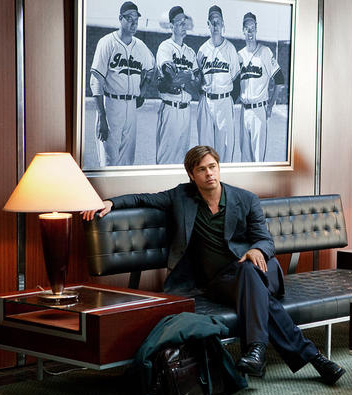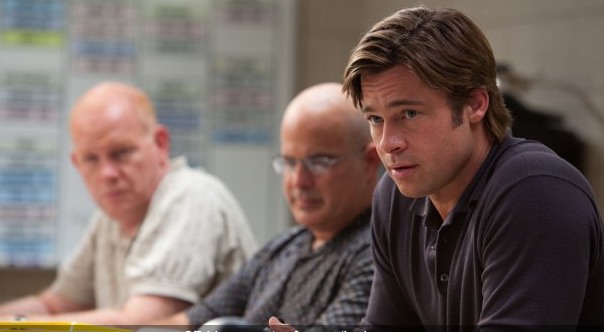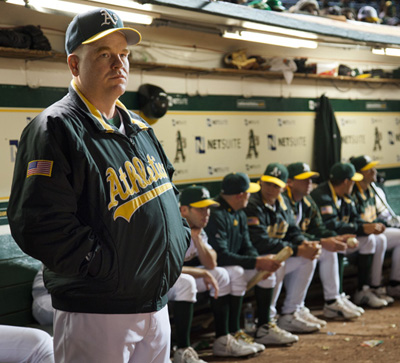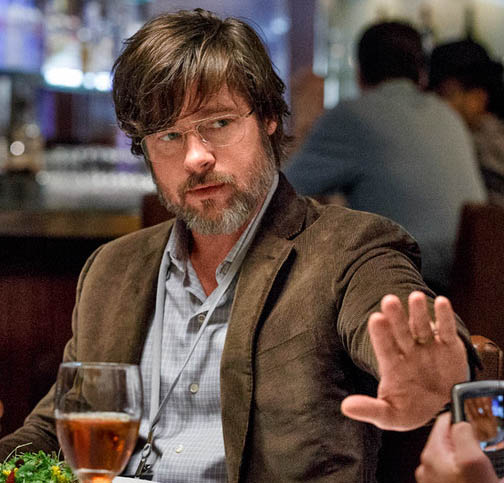It's a problem many a cash-strapped Premier League football manager is familiar with. The über-teams like Chelsea and Manchester United have loads more money than you, and can simply spend you out of contention. Over in California, this was what was happening to the Oakland A's baseball team as they headed into the 2002 season, as their top players were picked off by wealthier squads and they couldn't afford to replace them with stars of equal quality. "We're organ donors for the rich," as Oakland's general manager Billy Beane puts it.
A true story based on the bestselling book by bond-trader-turned-author Michael Lewis, Moneyball is a baseball movie that breaks the mould of baseball movies, just as Beane himself upended ingrained precepts of baseball management as he set about dragging his team out of the low-rent mire. Instead of the starry-eyed wish fulfilment of The Rookie or the nostalgia of Field of Dreams (even if Beane is fond of wondering ironically, "How can you not be romantic about baseball?"), it's a hard-boiled account of how he realised that tradition wasn't going to save him, and so pioneered a radical new system for building success. It's baseball's own Winning Ugly.
 Among the joys the film affords is the way it gives Brad Pitt an opportunity to stretch out and display a battle-hardened maturity previously not associated with the telegenic star. As Beane, he combines laconic pragmatism and bloody-minded determination, while deriving buckets of motivational fuel from his frustrated past as a hotly tipped baseball star who never delivered on his potential. Maybe there's an implicit wry contrast between Pitt's role here and his sometime mentor Robert Redford's portrayal of baseball hero Roy Hobbs in The Natural.
Among the joys the film affords is the way it gives Brad Pitt an opportunity to stretch out and display a battle-hardened maturity previously not associated with the telegenic star. As Beane, he combines laconic pragmatism and bloody-minded determination, while deriving buckets of motivational fuel from his frustrated past as a hotly tipped baseball star who never delivered on his potential. Maybe there's an implicit wry contrast between Pitt's role here and his sometime mentor Robert Redford's portrayal of baseball hero Roy Hobbs in The Natural.
On a visit to the Cleveland Indians to try to buy players (pictured above), Beane is treated with contempt, but with brilliant intuition he snatches away the Indians' geeky theoretician Peter Brand (Jonah Hill). He's an economist with a degree from Yale who has developed a new method of assessing the value of baseball players by using computerised analysis of their performances. He hadn't convinced Cleveland, but Beane perceives that this could be his lifeline. The clinching evidence is when Brand's assessment of Beane's past abilities as a player corresponds with the deflating reality rather than the hopeful hype he was fed.
Using Brand's calculations, he recruits a seemingly motley crew of lame, over-the-hill or temperamental players written off by other teams, and sets about proving that they can become match-winners when deployed in ways that maximise their overlooked strengths. "We are card counters at the blackjack table," is how Beane sums up their audacious plan to subvert the supposed natural order of things. And, crucially, his unfancied squad comes cheap.
Director Bennett Miller gives the film ballast and guts with his unsparing depiction of the decrepit male gerontocracy running Major League baseball (pictured above), its authenticity enhanced by the casting of several real-life professional scouts. Beane's outlandish new theories are treated like Satanists at a prayer meeting, and no one is more hostile than Oakland's field manager Art Howe (played like a dour, thick-necked old Marine colonel by Philip Seymour Hoffman [pictured below]). The story of how the underdogs battled this ossified hierarchy with a mixture of brains and bravado is a sure-fire winner, and the physical contrast between the still dashing Brad and Hill's bespectacled swot lends an unlikely-lads charm to the proceedings. Scenes where Beane nonchalantly sends the flabbergasted Brand to sack failing Oakland players lob some enjoyable black comedy into the mix, while Beane's motormouth, take-it-or-leave-it phone calls as he hustles rival team managers are a recurring motif.
 However, although screenwriters Aaron Sorkin and Steven Zaillian have done their persuasive best to put characterisation and the long climb against the odds centre stage, at some point the fact has to be faced that at its core this is a story about the analysis of reams of baseball statistics. I had the vague notion that there was some similarity between baseball and cricket - they both have batters, fielders and pitchers, for instance, if we make allowances for transatlantic nomenclature - but baseball's fixation with blizzards of stats and averages might tax even the intellectual resources of Stephen Hawking. The game's terminology (walk, bunt, top of the ninth etc) may also present a few problems to the European viewer, since you can lose sight of the keen edge of the action.
However, although screenwriters Aaron Sorkin and Steven Zaillian have done their persuasive best to put characterisation and the long climb against the odds centre stage, at some point the fact has to be faced that at its core this is a story about the analysis of reams of baseball statistics. I had the vague notion that there was some similarity between baseball and cricket - they both have batters, fielders and pitchers, for instance, if we make allowances for transatlantic nomenclature - but baseball's fixation with blizzards of stats and averages might tax even the intellectual resources of Stephen Hawking. The game's terminology (walk, bunt, top of the ninth etc) may also present a few problems to the European viewer, since you can lose sight of the keen edge of the action.
But such caveats aside, what carries Moneyball triumphantly to the tape is Miller's refusal to lapse into rose-tinted melodrama, a stance exemplified by his use (with one prominent exception) of real game footage instead of the usual sports movie re-enactments. Even when the A's have won a historic 20 matches on the trot and it looks like there's a Seabiscuit-style climax looming, Miller still has an ace and a couple of jokers up his sleeve. Despite its Academy-pleasing cast, this manages to be film-making a little bit outside the Hollywood box.
BRAD PITT’S BIG MOMENTS
 Allied. Doomed but entertaining attempt to revive 1940s Hollywood
Allied. Doomed but entertaining attempt to revive 1940s Hollywood
Fury. David Ayer and Brad Pitt take the war film by the scruff of the neck
Inglorious Basterds. Pitt is gloriously absurd in Tarantino WW2 alternative history
Killing Them Softly. Brad Pitt cleans up an almighty mess in Andrew Dominik’s high-calibre crime ensemble
The Big Short. Pitt’s on the money as director Adam McKay successfully makes a drama out of a crisis
The Counsellor. Ridley Scott ensemble thriller is nasty, brutish and short or mysterious, upsetting and alluring
The Tree of Life. Terrence Malick’s elliptical epic leads us through time, space and one family’s story
PLUS ONE TURKEY
World War Z. It's World War with a Zee as Brad Pitt battles the undead and a zombie script
Overleaf: watch the trailer to Moneyball

 Among the joys the film affords is the way it gives
Among the joys the film affords is the way it gives 
 However, although screenwriters
However, although screenwriters 